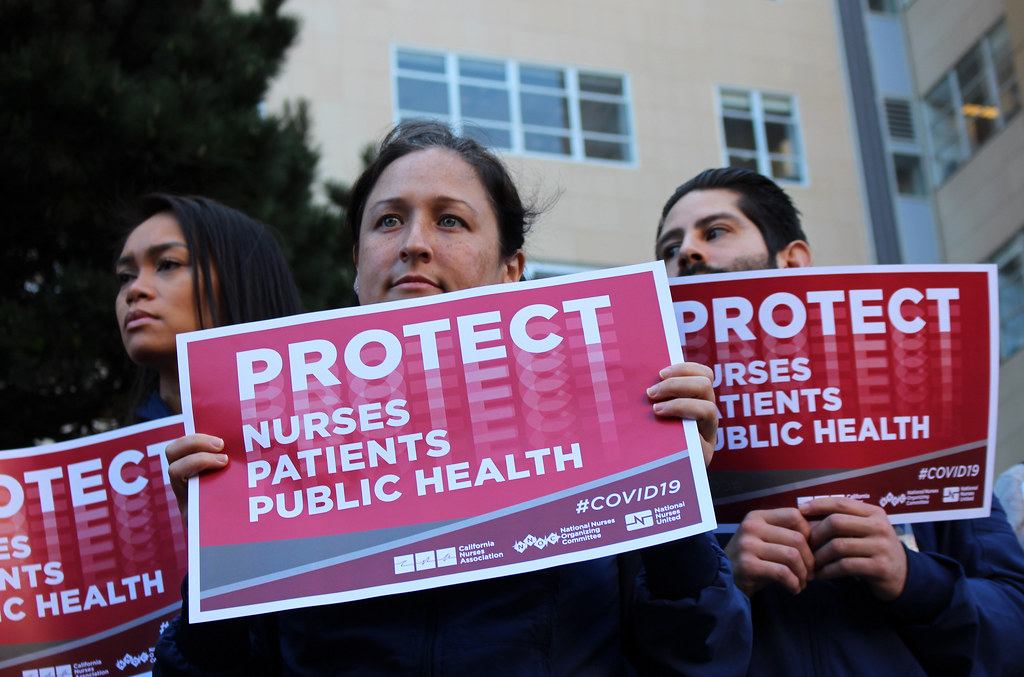Press Release
National Nurses United is Stepping Up Pressure On Hospital Employers Across the United States to Provide Safer Facilities

National Nurses United is stepping up pressure on hospital employers across the U.S. to provide safer facilities for health care workers and patients as confirmed coronavirus cases, and COVID-19 deaths, continue to skyrocket.
In recent days NNU has filed over 125 complaints with Occupational Safety and Health Administration (OSHA) offices in 16 states charging individual hospitals with failing to provide safe workplaces, as required by law.
Most of the filings concern insufficient personal protective equipment (PPE) for nurses and their co-workers which exposes health care workers and patients to severe risk of infection and further spreading of the dangerous virus. Complaints also cite other unsafe conditions, such as improper isolation rooms for infected, or suspected infected, patients.
“This is a national emergency and far too many hospitals are still failing to ensure that our caregivers who are placing their own safety at grave risk have the protections they need to stay at the bedside for their patients,” said NNU Executive Director Bonnie Castillo, RN.
Across the U.S., hundreds of health care workers have been infected, even with incomplete reports, with deaths of health care workers already reported in New York and Georgia.
Since January, NNU has pressed hospitals, and public agencies to ramp up the virus response with stronger safety standards in hospitals, optimal PPE, such as N95 respirator masks, full head to toe protective clothing, and other precautions.
Instead, many failed to act. The Centers for Disease Control and Prevention even rolled back recommended guidelines giving hospitals a green light to tell health care workers they could treat COVID-19 patients with far inferior coverings, such as loose-fitting surgical masks, and even bandanas or scarves.
“We have learned from tragedies in Italy and Spain that hospitals have become a major vector for the spread of COVID-19. That is happening in the U.S. now too. It is long past time for our hospitals to do more, far more, to guarantee they will protect the frontline nurses and other staff who are putting their own lives in grave danger every day,” Castillo said.
In about a dozen cases, so far, state OSHA branches have required the hospitals to respond within five days confirming that they are investigating and addressing the violation or face on-site investigation which could be followed by citations and fines for continuing to operate unsafe facilities.
At Marin General Hospital near San Francisco, for example, state regulators warned the hospital it “failed to provide necessary PPE to employees who may provide care to suspected COVID-19 cases.” Additionally, that the hospital was not meeting California’s standard, among the strongest in the nation, of an exposure plan and workplace precaution controls for airborne transmission as well as the more lax just droplet contagion.
Near Chicago, the state OSHA office notified Ingalls Memorial Hospital that it has received notice of alleged workplace hazards of “nurses assigned work in negative pressure units with COVID-19 patients not provided appropriate PPE and N95 respirators,” and “required to re-use PPE and N95 respirators or over extend their recommend use.” Additionally, the hospital reportedly has “some negative pressure rooms (that) do not function properly.”
Additionally, NNU members have submitted over 1,400 electronic complaints directly to employers citing similar concerns. NNU members have also engaged in multiple facility protests as well, including candlelight vigils and standing outside facilities, with signs and proper social distancing, to alert the public to unsafe safety protections inside.
California accounts for over 60 percent of the filings, at a time the state health department has been underfunding public health budgeting for a decade.
“With these filings, we are making it clear to both the hospitals and our state regulatory agencies that they have an essential job to do to protect public health and safety,” said Stephanie Roberson, legislative director for the California Nurses Association/NNU.
“If they don’t act now, our hospitals will quickly become overwhelmed with patients, and we will face a dire shortage of nurses who will themselves be sickened and no longer available to care for patients,” Roberson said.